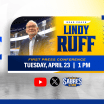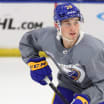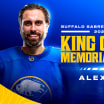Barb Aidelbaum's earliest memories of Sam Reinhart are as a young child at a hockey school in Whistler, B.C., where she was a skating instructor and Reinhart's dad, Paul, was a coach. Paul would bring his three sons along with him, and the oldest two - Max and Griffin - would take lessons.
Reinhart, the youngest of the bunch (he's nearly two years younger than Griffin, the middle child), was maybe 4 at the time.
Stronger, faster Reinhart ready to take next step
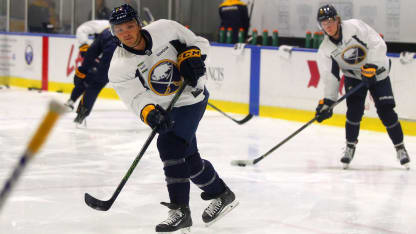
© Bill Wippert
"He was the baby," Aidelbaum says over the phone from Whistler. "He was the little guy just running around off the ice that couldn't wait to get out there at the time."
Some 15 years later, Reinhart returned to Aidelbaum. It was the summer of 2015 - one year after the Sabres had selected him with the No. 2 pick in the draft. He'd played nine games for the Sabres that fall, and then he was sent back to junior hockey in Kootenay, B.C. He was, as Aidelbaum puts it, a young man on a specific path.
"He wanted to make the Buffalo Sabres," she said. "It was one goal."
What happened next should sound familiar. When he arrived at camp that September, he had questions to answer - namely, was he ready to make the leap to the NHL? His strength and skating were considered question marks. He was diplomatic when answering those in the dressing room, but he did his real talking on the ice. Not only did he make the team, he scored 42 points (23+19) and evolved into a reliable top-six forward at age 20.
That success can be traced back to the work he put in with Aidelbaum that in Vancouver, which is why he's especially optimistic entering his sophomore campaign. This summer, Reinhart doubled down on his offseason training.
Learning to skate
When Aidelbaum first saw Reinhart skate two summers ago, she says, she knew he was a forward. Based on her evaluation, his defensive skating skills - the ability to skate backward and backward lateral movement, for example - were at an amateur level.
"When I stand back and I look at any player, I don't want to know what position they play," she said. "They should be able to do everything."
So the focus for much of Reinhart's first summer with Aidelbaum was on skating backward. He learned about what part of the blade to be on at what times - whether he should be leaning on the front, the back, or dead in the middle. These were all things he'd never thought of despite having played hockey his whole life.
"It translated to my forward skating," Reinhart said. "It's just something like that that's so strange. You wouldn't think to practice that and work on it, but it helped everything."
Learning, Aidelbaum says, came easy for him. One aspect of Reinhart's game that has never been knocked is his hockey sense. He sees plays as they develop, makes sound decisions on the ice and consistently puts himself in the proper areas to score goals.
In fact, his hockey knowledge and body awareness was so strong that sometimes he'd be given a tip - say, for example, thrusting his hips while maintaining a low shoulder - and it'd come so easy that he'd over-correct.
"We had to back it up a bit," Aidelbaum said. "I'd tell him, 'We're talking two inches, we're not talking a foot.'"
Reinhart said last season that playing alongside faster players makes him play faster himself, and never was that truer than when he became linemates with Jack Eichel in March. The two played well enough alongside each other that Bylsma is inclined to keep them together heading into this season.
Back in Vancouver, Reinhart would take part in intense conditioning programs with other NHL players once per week. There, his skating partners were professionals whose ability was at least in the same stratosphere as Eichel's.
"I think it's very natural for him to go and be a linemate with someone like Jack Eichel because in Vancouver, he's conditioning partners with someone as fast as Jack," Aidelbaum said.
"Not saying there's two Jack Eichels."
Overtime
As much as hockey IQ was and is a glaring strength for Reinhart, so was his work ethic last season. Practice ending for the team was simply the beginning of another drills session for Reinhart and alternate captain Ryan O'Reilly. As the season wore on, many of their teammates joined in.
Reinhart credited those sessions for the way he improved over his rookie season, so it's no surprise that he was willing to put in more work going into his second summer with Aidelbaum. Exactly how much more he did, however, is a testament to his eagerness to improve.
Aidelbaum brought Reinhart in for a meeting when he returned to Vancouver. They went over his exit interview with the Sabres and his plan for himself over the summer. With that, combined with the tape she had already watched from last season, she laid out a regimen of ice time that she thought he'd need in order to improve.
"He did double," Aidelbaum said. "Exactly double. What I've learned with him is that when he works hard and sees improvement, he then starts to work even harder. Many people will coast, but he's the exact opposite."
When Reinhart came back to camp last September, he was faster and more agile. This time around, his work reflects what made him successful last season: namely, scoring at the net-front. Fourteen of Reinhart's 23 goals came around the net last season; four were tipped shots and four more were rebounds. (He's scored twice on tips already this preseason.) He also helped his teammates by screening the goaltender on eight goals, seven of which came on the power play.
"The league knows who he is," Aidelbaum said. "Once you've established yourself in the league like he did, it had to be more than just speed. He had to be certainly more stable."
Accordingly, they worked this summer to make Reinhart more difficult to knock off his feet. His acceleration improved, as did his ability to catch a pass and accelerate simultaneously, a handy ability when playing alongside the likes of Eichel and Evander Kane.
"I think everything I did was more intense, more in-depth," Reinhart said. "Days got longer, busier, working on different things, different places. It was just a busy summer, but with that being said, I had a lot of down time, a lot of rest to focus and prepare for next season."
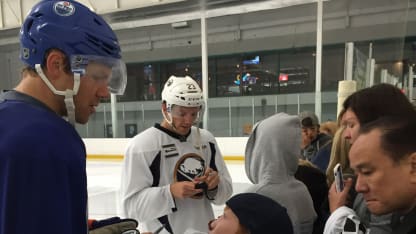
Wearing a letter
When Reinhart finishes his sessions in Vancouver, kids line up along the boards to meet him and get an autograph. The funny thing is, these kids sometimes aren't that much younger than he is. At 20 years old, Reinhart has a maturity beyond his years.
"It doesn't matter whether it's a game in Buffalo or practice in Vancouver, 365 days a year he takes a lot of time for the younger players," Aidelbaum said.
But the maturity shows on the ice, too. Reinhart was one of three Sabres sophomores, along with Eichel and Jake McCabe, to serve as an alternate captain during the preseason. Sabres coach Dan Bylsma said it's a concentrated effort to let those three players know that they're expected to take ownership and accountability in the dressing room.
It's a conversation that Josh Gorges, a full-time alternate captain, said the team had last season.
"We talked about that last year with the group," Gorges said. "Yes, you're considered a rookie. Yes, you're considered a young guy. But you've got to be a leader … I think all those guys too, they have the personalities.
"I think first and foremost, that's what makes them good hockey players, but it's gonna help with what they do from a leadership standpoint. It's great to see too that they're taking strides and they're wanting that as well. They're not reluctant to take on those responsibilities."
It's a shared mentality not only between Buffalo's young players, but everyone in the Sabres dressing room. Reinhart put in work this summer. Bylsma has commented that he can already see the improvement in Eichel's shot. Rasmus Ristolainen chose to be on the ice with his teammates even in the midst of a contract negotiation.
"I think this season is just the beauty of the situation we're in," Reinhart said. "If we're winning, everyone's doing the right things and everyone's playing well. That's the No. 1 priority and No.1 focus and I know we're all on board for that."



